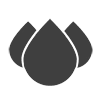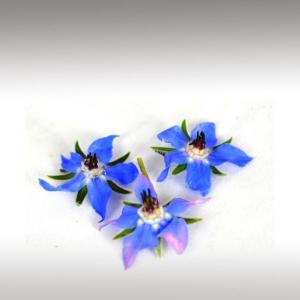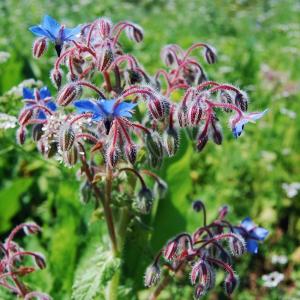
BORAGE OIL (BORAGO OFFICINALIS) - BASE OILS

BASE / GENERAL DATA
Information submited: June 19, 2014 Modified: April 3, 2018 By: OperaDreamhouse
Borage (Borago Officinalis), also known as a Starflower, is an annual herb. The leaves are edible and the plant is grown in gardens for that purpose in some parts of Europe. The plant is also commercially cultivated for borage seed oil extracted from its seeds.
It grows to a height of 60 - 100 cm, and is bristly or hairy all over the stems and leaves: the leaves are alternate, simple, and 5 - 15 cm long. The flowers are complete, perfect with five narrow, triangular-pointed petals. Flowers are most often blue in color, although pink flowers are sometimes observed.
In temperate climate such as in the UK, its flowering season is relatively long, from June to September. In milder climates, Borage will bloom continuously for most of the year.
One of the most important nutrients in Borage is essential fatty acids, something our body needs for good health. Essential fatty acids must be ingested from diet.
In foods, borage is eaten in salads and soups. It is used for a nice addition to a salad.
It grows to a height of 60 - 100 cm, and is bristly or hairy all over the stems and leaves: the leaves are alternate, simple, and 5 - 15 cm long. The flowers are complete, perfect with five narrow, triangular-pointed petals. Flowers are most often blue in color, although pink flowers are sometimes observed.
In temperate climate such as in the UK, its flowering season is relatively long, from June to September. In milder climates, Borage will bloom continuously for most of the year.
One of the most important nutrients in Borage is essential fatty acids, something our body needs for good health. Essential fatty acids must be ingested from diet.
In foods, borage is eaten in salads and soups. It is used for a nice addition to a salad.

SPIRITUAL PRACTISES DATA

MEDICINE / HEALTH DATA
Information submited: July 31, 2014 Modified: April 3, 2018 By: OperaDreamhouse
Throughout history Borage has been used to treat a multitude of ailments and to improve overall health.
Borage seed oil has been used to treat skin disorders such as eczema, seborrheic dermatitis, and neurodermatitis. It has also been used for rheumatoid arthritis, stress, premenstrual syndrome, diabetes, attention deficit-hyperactivity disorder (ADHD), acute respiratory distress syndrome (ARDS), alcoholism, pain and swelling (inflammation), and for preventing heart disease and stroke.
Borage seed oil may therefore have anti-inflammatory and anti-thrombotic effects and it has been studied for its potential to treat anti-inflammatory disorders, atopic eczema, and respiratory inflammation.
Borage seed oil has one of the highest amounts of γ-linolenic acid (GLA) of seed oils, higher than Blackcurrant seed oil or Evening Primrose oil, to which it is considered similar. GLA comprises around 24% of the oil typically. GLA is converted to dihomo-gamma-linolenic acid, a precursor to a variety of the 1-series prostaglandins and the 3-series leukotrienes. It inhibits leukotriene synthesis to provide therapy in rheumatologic illness.
Borage oil may improve heart and lung function and reduce lung inflammation in acute respiratory distress syndrome. Preliminary evidence suggests that gamma linolenic acid (GLA) may have some immunosuppressant activity that may be helpful in reducing asthma symptoms. Borage oil is also used to increase breast milk production and to treat bronchitis and colds.
An essential fatty acid deficiency can directly affect mood, internal inflammation and various cellular functions. In order for metabolic processes such as cardiovascular functions to work properly, they depend on the proper levels of essential fatty acids in the body.
The adrenal glands in our body work very hard all day to prepare our body for fight or flight situations, constantly releasing adrenalin into the body. Adrenal fatigue can occur when the body is overstressed. Borage is used to restore the adrenal glands to their natural balance, which in turn creates a calmer body and mind.
Borage oil is a good herbal supplement for women because it contains high levels of calcium and iron, nutrients many women are deficient in. Potassium, Zinc, B and C Vitamins, and Beta carotene are packed into the Borage plant making it very nutritional. Borage is popularly used for premenstrual syndrome (PMS) and menopausal symptoms. Borage works well to ease the depression and mood swings often associated with menopause and menstrual cycles as well and is a nice alternative to traditional prescription medications.
Borage oil is often used to boost GLA deficiencies in children as well to ensure proper growth.
Preliminary evidence suggests that borage has anti-inflammatory effects that may make it beneficial in treating periodontitis (gum disease).
Hyperlipidemia is often associated with increased risk of heart disease and strokes. Gamma linolenic acid may decrease plasma triglyceride levels and increase HDL-cholesterol concentration. It is also used for stres, diabetes, attention deficit-hyperactivity disorder (ADHD), pain and swelling (inflammation), and for stroke.
Borage is also used for a hormone problem called adrenal insufficiency, for "blood purification," to increase urine flow.
Preliminary evidence indicated that borage oil may have some benefits in cystic fibrosis patients.
Borage oil have an antioxidant effect.
Borage oil may contain the pyrrolizidine alkaloid amabiline, which is hepatotoxic leading to a risk of liver damage. Borage oil may help treat or prevent alcohol-induced hangovers, although additional study is needed in this area.
Side effects:
Borage oil may be unsafe during pregnancy because preliminary studies suggest Borage oil has a teratogenic effect and that its prostaglandin E agonist action may cause premature labor.
Gamma linolenic acid supplementation may increase cognitive development, weight gain, and length gain, particularly in boys. Another study is needed to confirm these results.
It is not recommended to be taken long term internally due to the concentration of alkaloids in Borage that can damage the liver.
Do not take Borage if you are taking anti-coagulants without discussing it with your doctor first. Nausea, cramping, bloating and headache are side effects that Borage can cause, although they are relatively mild.
Although the liquid is not thought to be an irritant, direct contact with the eye may produce transient discomfort characterized by tearing or conjunctival redness (as with windburn).
Borage seed oil has been used to treat skin disorders such as eczema, seborrheic dermatitis, and neurodermatitis. It has also been used for rheumatoid arthritis, stress, premenstrual syndrome, diabetes, attention deficit-hyperactivity disorder (ADHD), acute respiratory distress syndrome (ARDS), alcoholism, pain and swelling (inflammation), and for preventing heart disease and stroke.
Borage seed oil may therefore have anti-inflammatory and anti-thrombotic effects and it has been studied for its potential to treat anti-inflammatory disorders, atopic eczema, and respiratory inflammation.
Borage seed oil has one of the highest amounts of γ-linolenic acid (GLA) of seed oils, higher than Blackcurrant seed oil or Evening Primrose oil, to which it is considered similar. GLA comprises around 24% of the oil typically. GLA is converted to dihomo-gamma-linolenic acid, a precursor to a variety of the 1-series prostaglandins and the 3-series leukotrienes. It inhibits leukotriene synthesis to provide therapy in rheumatologic illness.
Borage oil may improve heart and lung function and reduce lung inflammation in acute respiratory distress syndrome. Preliminary evidence suggests that gamma linolenic acid (GLA) may have some immunosuppressant activity that may be helpful in reducing asthma symptoms. Borage oil is also used to increase breast milk production and to treat bronchitis and colds.
An essential fatty acid deficiency can directly affect mood, internal inflammation and various cellular functions. In order for metabolic processes such as cardiovascular functions to work properly, they depend on the proper levels of essential fatty acids in the body.
The adrenal glands in our body work very hard all day to prepare our body for fight or flight situations, constantly releasing adrenalin into the body. Adrenal fatigue can occur when the body is overstressed. Borage is used to restore the adrenal glands to their natural balance, which in turn creates a calmer body and mind.
Borage oil is a good herbal supplement for women because it contains high levels of calcium and iron, nutrients many women are deficient in. Potassium, Zinc, B and C Vitamins, and Beta carotene are packed into the Borage plant making it very nutritional. Borage is popularly used for premenstrual syndrome (PMS) and menopausal symptoms. Borage works well to ease the depression and mood swings often associated with menopause and menstrual cycles as well and is a nice alternative to traditional prescription medications.
Borage oil is often used to boost GLA deficiencies in children as well to ensure proper growth.
Preliminary evidence suggests that borage has anti-inflammatory effects that may make it beneficial in treating periodontitis (gum disease).
Hyperlipidemia is often associated with increased risk of heart disease and strokes. Gamma linolenic acid may decrease plasma triglyceride levels and increase HDL-cholesterol concentration. It is also used for stres, diabetes, attention deficit-hyperactivity disorder (ADHD), pain and swelling (inflammation), and for stroke.
Borage is also used for a hormone problem called adrenal insufficiency, for "blood purification," to increase urine flow.
Preliminary evidence indicated that borage oil may have some benefits in cystic fibrosis patients.
Borage oil have an antioxidant effect.
Borage oil may contain the pyrrolizidine alkaloid amabiline, which is hepatotoxic leading to a risk of liver damage. Borage oil may help treat or prevent alcohol-induced hangovers, although additional study is needed in this area.
Side effects:
Borage oil may be unsafe during pregnancy because preliminary studies suggest Borage oil has a teratogenic effect and that its prostaglandin E agonist action may cause premature labor.
Gamma linolenic acid supplementation may increase cognitive development, weight gain, and length gain, particularly in boys. Another study is needed to confirm these results.
It is not recommended to be taken long term internally due to the concentration of alkaloids in Borage that can damage the liver.
Do not take Borage if you are taking anti-coagulants without discussing it with your doctor first. Nausea, cramping, bloating and headache are side effects that Borage can cause, although they are relatively mild.
Although the liquid is not thought to be an irritant, direct contact with the eye may produce transient discomfort characterized by tearing or conjunctival redness (as with windburn).

BEAUTY / COSMETICS DATA
Information submited: July 31, 2014 Modified: April 3, 2018 By: OperaDreamhouse
Suitable for sensitive, dry, combination, mature skin types.
Moisturizing to dry skin
Soothing to sensitive skin
Balances and tones combination skin.
Borago Officinalis, is one of the best choices for anti-aging, and wrinkle reducing, product lines where it offers regenerative, and firming, properties helping to restore hydration and elasticity. In the body, gamma linolenic acid is converted into prostaglandinl. Prostaglandinl helps heal inflammation of the skin and promotes skin health.
Borage oil is used for its rich natural source of gamma-Linolenic Acid (GLA), an important omega-6 fatty acid which is required for healthy skin cell membranes. Borage is applied to the skin for infantile seborrheic dermatitis and is also used in a dressing to soften the skin.
Borage Seed oil can aid in healing symptoms of dry and cracked skin.
Borage oil also improve hair and nail growth and appearance.
Moisturizing to dry skin
Soothing to sensitive skin
Balances and tones combination skin.
Borago Officinalis, is one of the best choices for anti-aging, and wrinkle reducing, product lines where it offers regenerative, and firming, properties helping to restore hydration and elasticity. In the body, gamma linolenic acid is converted into prostaglandinl. Prostaglandinl helps heal inflammation of the skin and promotes skin health.
Borage oil is used for its rich natural source of gamma-Linolenic Acid (GLA), an important omega-6 fatty acid which is required for healthy skin cell membranes. Borage is applied to the skin for infantile seborrheic dermatitis and is also used in a dressing to soften the skin.
Borage Seed oil can aid in healing symptoms of dry and cracked skin.
Borage oil also improve hair and nail growth and appearance.

FOOD / COOKING DATA
Information submited: July 31, 2014 Modified: April 3, 2018 By: OperaDreamhouse
Borage (Borago officinalis) is an herb native to Syria that has spread throughout the Middle East and Mediterranean. Borage flowers and leaves may be eaten and borage seeds are often pressed to produce oil very high in gamma-linolenic acid (GLA).
COMMENTS
No comments.
Newest mixtures containing Borage Oil (Borago Officinalis):

Softening hand balm
August 19, 2015



